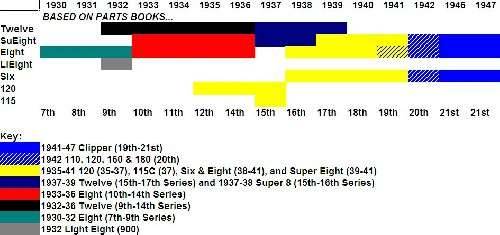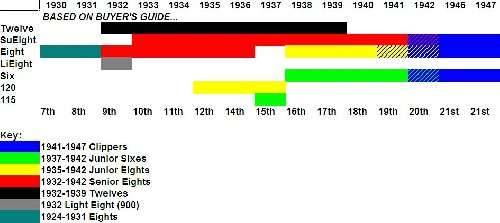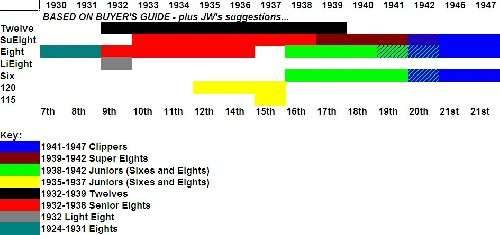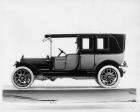|
Pre War Service Index Groupings
|
||||
|---|---|---|---|---|
|
Webmaster
|
Need some help from the Pre-War gurs on coming up with logical groupings from the Pre-War models to help with the Pre-War service index. The post was year were a little more set in stone with how the service information was applied across models, but the pre-war years are a bit more chaotic in that regards.
Currently Brian has 41-47 Clipper as a grouping at that is online. What is the next logical grouping going backwards? 40-42 Seniors? (because of the switch to the 356 motor) 1932-42 120s? Twelves? If you guys can help with some ideas there, that help us out as neither Brian nor myself are Gurus in the pre-war cars, and our requests for assistance on those have gone unanswered. Thanks,
Posted on: 2011/5/19 12:14
|
|||
|
-BigKev
1954 Packard Clipper Deluxe Touring Sedan -> Registry | Project Blog 1937 Packard 115-C Convertible Coupe -> Registry | Project Blog |
||||
|
||||
|
Re: Pre War Service Index Groupings
|
||||
|---|---|---|---|---|
|
Webmaster
|
Excellent JW, that is a good grouping.
Also I am thinking 32-39 Twelve's is a logical grouping. I also think 40-42 Custom & Supers are a grouping because of the switch to the 356 motor. 1928 and prior can be their own as the inforamtion for those models is going to be very sparse. So the only ones in question are how to split up the 1929-1939 Eights & Super Eights, and of course the '32 Light Eight into logical groupings without getting to granular. Based on engine or major style changes? Ideas? Suggestions? Perhaps this attachment may help:
Posted on: 2011/5/19 15:42
|
|||
|
-BigKev
1954 Packard Clipper Deluxe Touring Sedan -> Registry | Project Blog 1937 Packard 115-C Convertible Coupe -> Registry | Project Blog |
||||
|
||||
|
Re: Pre War Service Index Groupings
|
||||
|---|---|---|---|---|
|
Forum Ambassador

|
You might go along these lines:
Differences between the Light Eight (900) and other Eights of that era is mostly the front clip and elimination of some features like the Bijur, Pines winterfront, etc. So I think you could logically keep the Light Eight with the other Eights that shared the same basic engine. In fact some 1933 Eight sedans used leftover Light bodies with new front clips on a shortened wheelbase and the 34 Eights returned to the 1932 wheelbase. One logical place to break the 320 and 385 engined Seniors is at 1937 as that's where the 320 engine became the Super Eight, IFS was adopted, hydraulic brakes were adopted, etc. If you didn't want to break out the 37-39 Senior Eights because of the changes noted above, then you could consider All 320, 357 and 385 Eights, 1924-1939 as a single grouping.
Posted on: 2011/5/19 16:24
|
|||
|
||||
|
Re: Pre War Service Index Groupings
|
||||
|---|---|---|---|---|
|
Forum Ambassador

|
Sorry to be late to the party.
Using shop manual coverage was a natural for 55-56 and 51-54 installments, but things began to get blurry with 22nd-23rd Series. Thanks goes to Clipper47, way back, for suggesting they be covered in an installment all their own, 48-50, and then one for the Clippers, 41-47, which follows the 1941-47 Clipper Master Parts Book. That just leaves the non-Clipper models from the mash-up of 1942 offerings dangiling in the wind - chassis 2004-05-07-08-20-21-23-30-55. Working back in time, to 1930, prewar shop manuals seem a bit choppy in their coverage, but parts books don't seem to follow a simple pattern of years/Series, either. Consider the coverage shown by the available reprints: * 1935-41: 120 (35-37), 115C (37), Six & Eight (38-41), and Super Eight (39-41) * 1937-39: Twelve, 15th-17th Series and 1937-38 Super 8, 15th-16th Series * 1932-36: Twelve, 9th-14th Series * 1933-36: Eight, 10th-14th Series (incl. Super Eight) * 1930-32: Eight, 7th-9th Series * 1932: Light Eight "900" Owen_Dyneto's suggestion for combining the Light Eight with the rest of the Eights makes sense to me. Looks like the only 8-cyl. car for 1937 was the 120, which was a completely different chassis. So, do we go with "1930-32 Eights" or "1930-36 Eights" or "1930-32 and 1933-36 Eights"? However, the lines between editions of the intervening years are awfully blurry to me. I can't tell if PMCC was trying to distinguish between Junior vs. Senior or what. JW's suggestion of "1935 thru 1942 Junior Packards" is similar to what I had been considering, but it could easily be 50% larger than even the 41-47 Clipper installment. I also like the sound of "1935-1942 Juniors (12th->20th Series)" as a title, but I get hung up on the term "Junior". I suspect that there may have been a parts book exclusively on 120s, at one time, but the catalog format was revised in 1940, which explains the markedly improved 35-41 edition. From what I can tell, as a mere layperson, it appears that the all-new 120 platform for 1935 was extended downward to the 115 for 1937, and these model became the Eight and Six, respectively, for 1938. Yet, come 1939, the Super Eight gets folded into the mix. Yet, come 1939, the Super Eight gets folded into the mix. Does this mean that the Super Eight was then a "Junior"? Equally confusing, parts for the 1937-38 Super Eights are covered with the 1937-39 Twelves, but 1933-36 Super Eights are covered together with Eights of same period, rather than with the 1932-36 Twelves. Why is that? On the other hand, I've see some Service Letter articles that cite application by SIX and/or EIGHT and SUPER EIGHT and TWELVE, rather than chassis or Series. Seems like the Customs fell under the Super Eight chassis designation for many years. Yet, if we group installments by motor, that could create an undue number of duplicate entries for other chassis and body topics shared between different engines. I'd like to hear some additional input on this and previous posts in this thread - won't be much progress on the Service index without it.
Posted on: 2011/5/19 22:26
|
|||
|
||||
|
Re: Pre War Service Index Groupings
|
||||
|---|---|---|---|---|
|
Home away from home
|
Brian, maybe the 1939 Super Eight is unique enough with the old style 8-cylinder engine and the new style body that it could have its own singular group?
(o{I}o)
Posted on: 2011/5/20 21:32
|
|||
|
We move toward
And make happen What occupies our mind... (W. Scherer) |
||||
|
||||
|
Re: Pre War Service Index Groupings
|
||||
|---|---|---|---|---|
|
Forum Ambassador

|
JW -
Thanks for the additional input. Since my last post, I decided to crack open a book - namely, Richard Langworth's Illustrated Packard Buyer's Guide, which was written for the layperson. Therein, he stratifies cars of this era into the following chapters: * 1924-1931 Eights * 1932-1942 Senior Eights * 1932-1939 Twelves * 1935-1942 Junior Eights * 1935-1942 Junior Sixes ...which provide some food for thought. The chapter on "Junior Eights" includes 1935-37 120, 1938 Eight, 1939-42 One Twenty, and the 1942 Eight* convertible. "Junior Sixes" covers 1937-39 Six, 1940-42 One Ten, and 1942 Six* models. (* excluding 1942 Clippers). Combining these models fits right in with your previous suggestion for a "1935 thru 1942 Junior Packard" grouping. Then, Langworth's classification of "Senior Eights" intrigued me - with the notion that all Eights of this period (except for 120, One Twenty, and Clipper) were Seniors. Apparently, for 1933, the Deluxe Eight became the Super Eight, and carried forward from there. A watershed point arises, as you noted, with the new engine in 1940, which is where all the articles on hydraulic lifters begin. These topics continue into the Super Eights under the Clipper designations, but I wouldn't want to break those models out from the 41-47 Index. Whether or not to split 1939/1940-1942 Super Eights (except Clippers) off into their own installment(s) seems like a valid consideration. Yet I've seen other technologies making their appearance in 1939 like Handishift (column gear shifter), Econo Drive (overdrive), and Fifth Shock Absorber (a lateral steering stabilizer?). How closely do we want to follow technological boundaries? Should we, then, split the 35-42 Juniors into 35-38 and 39-42, and make a 39-42 Super Eight group, leaving us with 32-38 Senior Eights? As parts books jaggedly broke things up into a half dozen editions, when the dust settled, I am sensitive to things "getting too granular", as Kev noted. Any thoughts on this or other considerations? Anyone else?
Posted on: 2011/5/20 23:04
|
|||
|
||||
|
Re: Pre War Service Index Groupings
|
||||
|---|---|---|---|---|
|
Home away from home
|
Brian, we could have separate groupings for the 1935 thru 1937 Junior Eights and Sixes, and another grouping for the 1938 thru 1942 cars (excluding the Clippers). If you separate the Sixes from the Junior Eights in this scheme then you end up with a single year group for the 1937 Six (which was unique and a one-year model like 1939 Senior Eight). The 1938 Juniors were different cars than their earlier versions with all steel bodies and the improved engines.
If there is a need to go more granular, then I would suggest a group for the 1935 thru 1937 Junior Eights and Sixes, and another grouping for these cars from 1938 thru 1942 (less Clippers). I would not parce any deeper than this. I'll leave suggestions about the pre-war Senior Eights to those who are more versed in these models.
Posted on: 2011/5/21 9:32
|
|||
|
We move toward
And make happen What occupies our mind... (W. Scherer) |
||||
|
||||
|
Re: Pre War Service Index Groupings
|
||||
|---|---|---|---|---|
|
Forum Ambassador

|
JW -
Thanks for your further insight - very helpful. For the benefit of all, I decided to take a cue form BigKev's "Model Series Progresssion Chart", and come up with a graphic depiction of what we're talking about. Not to belabour the point, but let's consider parts book coverage for years 1930-47. It's not as diced up as shop manuals, but a bit confusing - seven areas, not counting the 41-47 Clipper. Diagonal blue lines represent the overlap of Clipper models in 1941-42. If we extend the treatment to Langworth's coverage, we only reduce the number of areas by one, but they seem to make a little more sense (to me). Then, if we take your suggestions to make groupings for 35-37 and 38-42 Juniors, but split off 39-42 Super Eights, the number of groupings goes back up by one, but things are a little clearer - no?. Yet, I've left the Light Eight dangling out there, as an open question to anyone who is interested: where can we fold this one into, under the modified Buyer's Guide scheme? (Click on each image, below, to enlarge in a new window.)
Posted on: 2011/5/21 11:20
|
|||
|
||||
|
Re: Pre War Service Index Groupings
|
||||
|---|---|---|---|---|
|
Home away from home
|
Since a lot of the service information relates to mechanical items it may make sense to split the groups into similar chassis types.
Twelves could be separate and 8's othe than the 120's from 1938 and earlier could be another group. Sixes and 120's from 1935 to 1942 other than Clippers have a lot in common. The 160's and 180's from 1940 to 1942 also hava a lot in common with the Junior cars but could be split into a separate category The 1939 Super 8 falls more into the 1935 to 42 group as well since only the engine is carried over from the earlier Senior cars. Suspension, transmission and rear axle have more in common with the other 1939 models (except the 12) A quick look through the articles might also reveal whther there is enough unique information to justify a separate category Brian
Posted on: 2011/5/21 14:32
|
|||
|
||||


 (52.21 KB)
(52.21 KB)









